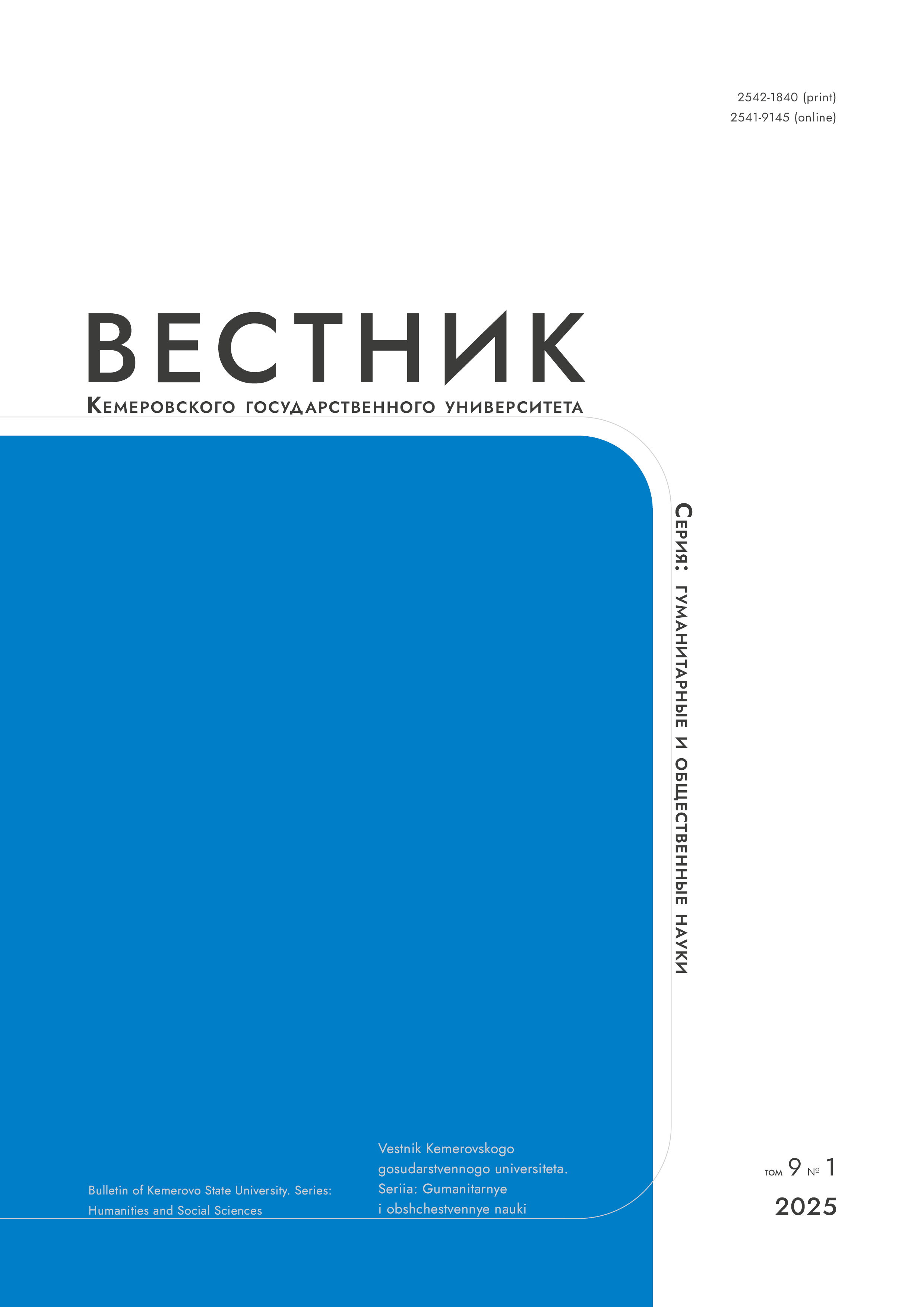Kemerovo, Russian Federation
Kemerovo, Russian Federation
Kemerovo, Russian Federation
Kemerovo, Russian Federation
Cognitive linguistics, psychophysiology, cardiology, and pathological psycholinguistics have common theory and methodology. Clinical linguistics is a new area of research within cognitive science. The authors reviewed domestic and foreign studies of communicative disorders published in 1981–2022. The review focused on the cardiology, neurology, and pathological psycholinguistics of speech abnormalities, which demonstrated similar terminology and methods. The authors identified three research directions: 1) disorders associated with the period of intrauterine, intranatal, or early postpartum development; 2) age-related disorders; 3) disorders caused by a prior disease or brain injury. The language and communication profile of patients with cognitive impairments was different, but all aspects of language and communication fell into the field of psychophysiology, cardiology, and pathological psycholinguistics, thus remaining within an interdisciplinary paradigm. The review highlighted some terminological inconsistency of studies focused on the analysis of language and speech in cognitive linguistics. The authors proved that clinical linguistics is a separate branch of cognitive research that bridges a certain gap between theory and practice. They defined the main objectives of clinical linguistics as the coordination of the conceptual and terminological research apparatus, unification of methodology, and development of unified principles for language and communication research.
cognitive linguistics, clinical linguistics, cognitive disorders, communicative disorders, psychophysiology, cardiology, pathological psycholinguistics
1. Chaplya T. V. Language as a means of socialization. Siberian Pedagogical Journal, 2014, (2): 9-14. (In Russ.) EDN: https://elibrary.ru/SAJATX
2. Popkova E. B. Theoretic approaches of enculturation study as a social process. Theory and Practice of social Development, 2013, (3): 43-48. (In Russ.) EDN: https://elibrary.ru/PWVVZZ
3. Borovcsova L. A., Ivanova N. N. Psychological structure of speech violations in general speech underdevelopment at preschool age. Vestnik Tambovskogo universiteta. Seriya: Gumanitarnyye nauki, 2013, (12): 292-301. (In Russ.) EDN: https://elibrary.ru/RVVCZX
4. Grevtsova E. V. Social aspects of working with elderly people with speech disorders. Speech therapy: modern appearance and contours of the future: Proc. II All-Russian Sci.-Prac. Conf. with Intern. Participation, Moscow, 1-2 Nov 2021. Moscow: MPSU, 2021, 130-135. (In Russ.) EDN: https://elibrary.ru/PWWWKB
5. Van Riper C., Emerick L. Speech correction: an introduction to speech pathology and audiology. 8th ed. USA, 1990, 532.
6. Hegde M. N. Introduction to communicative disorder. 3rd ed. Texas: ProEd, Austin, 2001, 517.
7. Fotekova T. A., Akhutina T. V. Diagnostics of speech disorders in schoolchildren using neuropsychological methods. Moscow: ARKTI, 2002, 136. (In Russ.) EDN: https://elibrary.ru/QRVENB
8. Dodd B. Evidence-based practice and speech-language pathology: strengths, weaknesses, opportunities and threats. Folia Phoniatr Logop, 2007, 59(3): 118-129. https://doi.org/10.1159/000101770
9. Dennis M. Language disorders in children with central nervous system injury. Journal of Clinical and Experimental Neuropsychology, 2010, 32(4): 417-432. https://doi.org/10.1080/13803390903164355
10. Stepanenko D. G., Sagutdinova E. Sh. About speech / language disorders classifications in childhood. System Integration in Health Care, 2010, (2): 32-43. (In Russ.) EDN: https://elibrary.ru/MSSTAH
11. Beitchman J. H., Brownlie E. B., Bao L. Age 31 mental health outcomes of childhood language and speech disorders. Journal of the American Academy of Child & Adolescent Psychiatry, 2014, 53(10): 1102-1110. https://doi.org/10.1016/j.jaac.2014.07.006
12. Bobkova S. S. Difference of approaches in the theory and practice of correcting speech disorders in Russia and abroad. Special education: Proc. XIII Intern. Sci.-Prac. Conf., St. Petersburg, 26-27 Apr 2017. St. Petersburg: Pushkin LSU, 2017, vol. II, 14-18. (In Russ.) EDN: https://elibrary.ru/YQCQBP
13. Pozdniak V. V. Pattern of speech disorders and behavioral disorders in children. Prikladnye informatsionnye aspekty meditsiny, 2018, 21(2): 100-106. (In Russ.) EDN: https://elibrary.ru/YWIGNQ
14. Stankevich A. N., Kuryakina T. V. Correction of speech disorders in children with disabilities through logorhythmics. Pedagogy and psychology: development prospects: Proc. All-Russian Sci.-Prac. Conf., Cheboksary, 27 Nov 2020. Cheboksary: Interactive plus, 2020, 183-185. (In Russ.) EDN: https://elibrary.ru/BGZPXG
15. Mezhidova M. R. The role of clinical linguistics in the language disorders treatment. Vestnik Meditsinskogo instituta, 2021, (1): 70-73. (In Russ.) https://doi.org/10.36684/med-2021-19-1-70-73
16. Nemkova S. A. Speech disorders in children with cerebral palsy: diagnosticis and correction. Zhurnal Nevrologii i Psikhiatrii imeni S. S. Korsakova, 2019, 119(5): 112-119. (In Russ.) https://doi.org/10.17116/jnevro2019119051112
17. Koziavkin V. I., Shestopalova L. F., Podkorytov V. S. Children's cerebral palsy. Medico-psychological problems. Lviv: Ukrainski tekhnologii, 1999, 144. (In Russ.)
18. Magomedova A. N., Magomedova A. A. Features of speech development and correction of its impairment in children with cerebral palsy. Scientific trends: pedagogy and psychology: Proc. XXVI Intern. Sci. Conf., St. Petersburg, 4 Nov 2019. St. Petersburg: IUAS, 51-55. (In Russ.) https://doi.org/10.18411/sciencepublic-04-11-2019-16
19. Wing L. Language, social and cognitive impairments in autism and severe mental retardation. Journal of Autism and Developmental Disorders, 1981, 11(1): 31-44. https://doi.org/10.1007/BF01531339
20. Shchukina D. A. The problem of studying the speech of children with autism spectrum disorders. Spetsialnoe obrazovanie, 2014, I(X): 230-232. (In Russ.)
21. Morozova T. I. Deviations in speech development in childhood autism and the principles of their correction. Autism: guidelines for corrective work, ed. S. A. Morozov. Moscow: Signal, 2003, 88-109. (In Russ.)
22. Adilzhanova M. A., Tishina L. A. Characteristic of communicative profiles of children with autistic spectrum disorders using assessment criteria of speech development. Modern high technologies, 2020, (4): 89-94. (In Russ.) https://doi.org/10.17513/snt.37978
23. Kurova A. A. Features of speech development disorders in children with autism spectrum disorders. Molodoi uchenyi, 2021, (12): 241-243. (In Russ.) EDN: https://elibrary.ru/ICKQQC
24. Skrobkina O. V. Problems of oral and written speech of children with autism and features of logopedic work in the Center for Psychological, Medical and Social Support of Children and Adolescents. Children's autism: research and practice, ed. Kasatkin V. N. Moscow: Obrazovanie i zdorovie, 2008, 236-252. (In Russ.)
25. Engelhardt E., Grinberg L. T. Alzheimer and vascular brain disease: senile dementia. Dementia & Neuropsychologia, 2015, 9(2): 184-188. https://doi.org/10.1590/1980-57642015DN92000013
26. Fraser K., Meltzer J. A., Rudzicz F. Linguistic features identify Alzheimer's disease in narrative speech. Journal of Alzheimer's Disease, 2015, 49(2): 407-422. https://doi.org/10.3233/JAD-150520
27. Dashtipour K., Tafreshi A., Lee J., Crawley B. Speech disorders in Parkinson's disease: pathophysiology, medical management and surgical approaches. Neurodegenerative disease management, 2018, 8(5): 337-348. https://doi.org/10.2217/nmt-2018-0021
28. Toledo C., Aluisio S. M., dos Santos L. B., Brucki S. M. D., Trés S. E., de Oliveira M. O., Mansur L. L. Analysis of macrolinguistic aspects of narratives from individuals with Alzheimer's disease, mild cognitive impairment, and no cognitive impairment. Alzheimer's & Dementia: Diagnosis, Assessment & Disease Monitoring, 2018, 10(1): 31-40. https://doi.org/10.1016/j.dadm.2017.08.005
29. Arefyeva A. P., Skripkina N. A., Vasenina E. E. Speech disorders in Parkinson's disease. Zhurnal Nevrologii i Psikhiatrii imeni S. S. Korsakova, 2019, 119(9-2): 32-36. (In Russ.) https://doi.org/10.17116/jnevro201911909232
30. Banovic S., Zunic L. J., Sinanovic O. Communication difficulties as a result of dementia. Materia Socio-Medica, 2018, 30(3): 221-224. https://doi.org/10.5455/msm.2018.30.221-224
31. Orlova O. S., Berdnikovich E. S., Myasnikova M. S. Speech disorders in Parkinson's disease. Social and humanitarian problems of our time: Proc. Intern. Sci.-Prac. Conf., Belgorod, 24 Apr 2020. Belgorod: APNI, 2020, 103-108. (In Russ.) EDN: https://elibrary.ru/VCSBOR
32. Vasenina E. E., Levin O. S. Characteristics of the clinical picture and treatment of moderate or severe Alzheimer’s disease. Zhurnal Nevrologii i Psikhiatrii imeni S. S. Korsakova, 2015, 115(6-2): 17-25. (In Russ.) https://doi.org/10.17116/jnevro20151156217-25
33. Yakhno N. N., Zakharov V. V., Lokshina A. B., Koberskaya N. N., Mkhitaryan E. A. Dementia. Practical guide for physicians. Moscow: MEDpress-inform, 2010, 272. (In Russ.) EDN: https://elibrary.ru/QLXEDR
34. Mozhejko E. Yu. Recovery of speech disorders in poststroke patients: the urgency, problems and prospects. Siberian Medical Review, 2008, (2): 16-20. (In Russ.) EDN: https://elibrary.ru/JVMJEJ
35. Kurushina O. V., Barulin A. E., Kurakova E. A., Ansarov H. Sh. Speech disorders and their correction in post-stroke patients. Meditsinskiy Sovet, 2017, (5): 28-32. (In Russ.) https://doi.org/10.21518/2079-701X-2017-5-28-32
36. Grishina D. A. Speech disorders in neurodegenerative diseases. Effektivnaia farmakoterapiia, 2017, (31): 56-61. (In Russ.) EDN: https://elibrary.ru/ZFVWLF
37. Burmakina N. G., Detinko Iu. I., Kulikova L. V., Popova Ya. V. Speech disorders testing: practices of European and Russian clinical linguistics. Journal of Siberian Federal University. Humanities and Social Sciences, 2020, 13(12): 1973-1984. https://doi.org/10.17516/1997-1370-0705
38. Burmakina N. G., Kulikova L. V., Popova Ya. V. Internationalization of clinical linguistics experience: an analysis of European approaches to testing speech disorders of aphasia. Political Linguistics, 2020, (4): 81-88. (In Russ.) https://doi.org/10.26170/pl20-04-10
39. Vidović M., Sinanović O., Sabaskić L., Haticić A., Brkić E. Incidence and types of speech disorders in stroke patients. Acta Clinica Croatica, 2011, 50(4): 491-494.
40. Bellinger D. C., Wypij D., Kuban K. C. K., Rappaport L. A., Hickey P. R., Wernovsky G., Jonas R. A., Newburger J. W. Developmental and neurological status of children at 4 years of age after heart surgery with hypothermic circulatory arrest or low-flow cardiopulmonary bypass. Circulation, 1999, 100(5): 526-532. https://doi.org/10.1161/01.cir.100.5.526
41. Puosi R., Korkman M., Sarajuuri A., Jokinen E., Mildh L., Mattila I., Lönnqvist T. Neurocognitive development and behavioral outcome of 2-year-old children with univentricular heart. Journal of the International Neuropsychological Society, 2011, 17(6): 1094-1103. https://doi.org/10.1017/S135561771100110X
42. Brosig C., Mussatto K., Hoffman G., Hoffmann R. G., Dasgupta M., Tweddell J., Ghanayem N. Neurodevelopmental outcomes for children with hypoplastic left heart syndrome at the age of 5 years. Pediatric Cardiology, 2013, 34: 1597-1604. https://doi.org/10.1007/s00246-013-0679-3
43. Fourdain S. S., St-Denis A., Harvey J., Birca A., Carmant L., Gallagher A., Trudeau N. Language development in children with congenital heart disease aged 12-24 months. European Jornal Paediatric Neurology, 2019, 23(3): 491-499. https://doi.org/10.1016/j.ejpn.2019.03.002
44. Scherwitz L., Graham L. E. II, Grandits G., Billings J. Speech characteristics and coronary heart disease incidence in the multiple risk factor intervention trial. Journal of Behavioral Medicine, 1990, 13(1): 75-91. https://doi.org/10.1007/BF00844900
45. Hemphill L., Uccelli P., Winner K., Chang C.-j., Bellinger D. Narrative discourse in young children with histories of early corrective heart surgery. Journal of Speech, Language, and Hearing Research, 2002, 45(2): 318-331. https://doi.org/10.1044/1092-4388(2002/025)
46. Hövels-Gürich H. H., Bauer S. B., Schnitker R., Willmes-von Hinckeldey K., Messmer B. J., Seghaye M.-C., Huber W. Long-term outcome of speech and language in children after corrective surgery for cyanotic or acyanotic cardiac defects in infancy. European Journal of Paediatric Neurology, 2008, 12(5): 378-386. https://doi.org/10.1016/j.ejpn.2007.10.004
47. Hicks M. S., Sauve R. S., Robertson C. M. T., Joffe A. R., Alton G., Creighton D., Ross D. B., Rebeyka I. M. Early childhood language outcomes after arterial switch operation: a prospective cohort study. Springerplus, 2016, 5(1). https://doi.org/10.1186/s40064-016-3344-5
48. Sommariva G., Zilli T., Crescentini C., Marini A., Pilotto C., Venchiarutti M., Gortan A. J., Fabbro F., Cogo P. Toward a characterization of language development in children with congenital heart disease: a pilot study. Child Neuropsychology, 2020, 26(1): 1-14. https://doi.org/10.1080/09297049.2019.1617261
49. Turner T., El Tobgy N., Russell K., Day C., Cheung K., Proven S., Ricci M. Language abilities in preschool children with critical CHD: a systematic review. Cardiology in the Young, 2022, 32(5): 683-693. https://doi.org/10.1017/S1047951122001330
50. Wernovsky G., Stiles K. M., Gauvreau K., Gentles T. L., duPlessis A. J., Bellinger D. C., Walsh A. Z., Jonas R. A., Mayer J. E. Jr., Newburger J. W. Cognitive development after the Fontan operation. Circulation, 2000, 102(8): 883-889. https://doi.org/10.1161/01.cir.102.8.883
51. Murray L. L. Cognitive and communicative consequences of cardiovascular disease. Perspectives on Neurophysiology and Neurogenic Speech and Language Disorders, 2008, 18(4): 152-161. https://doi.org/10.1044/nnsld18.4.152


















